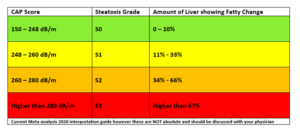Fibroscan Test Explained: What Your Results Mean
The Fibroscan test has become an indispensable tool for liver health, offering a non-invasive and efficient method to assess the liver’s condition. This test is particularly crucial for those at risk of or managing liver diseases, providing valuable insights without the need for more invasive procedures. Additionally, even without liver issues, this test is an excellent indicator of your overall well-being.
What is a Fibroscan Test?
A Fibroscan test, also known as transient elastography, is a technique used to measure the stiffness of the liver. This measurement helps doctors understand the extent of fibrosis (scarring) or steatosis (fat accumulation) in the liver. The procedure involves a specialised ultrasound device that sends vibrations into the liver and measures the speed of their return, providing an immediate metric of liver stiffness. This painless test typically takes only a few minutes, offering the patient a quick and comfortable experience.
Preparing for the Test
Preparing for a Fibroscan test is straightforward. Patients are usually advised to fast for several hours prior to the test to ensure accuracy. It’s important to wear comfortable clothing that allows easy access to the liver area. During the test, you will lie on your back with your right arm raised behind your head. A probe is then placed on the skin over the liver. The process is quick and typically free of discomfort.
Understanding Your Fibroscan Results
A Fibroscan test is essentially an advanced ultrasound for your liver. It measures two key things: fibrosis (possible scarring) and steatosis (fat accumulation). These measurements help doctors understand the state of your liver health and decide on the best course of action. Your doctor might also suggest other tests like blood tests, imaging scans, or biopsies to get a complete picture of your liver health.
What is a CAP Score?
Your CAP score measures how much fat is in your liver and is measured in decibels per meter (dB/m). It ranges from 100 to 400 dB/m. Higher scores mean more fat. The score below helps your doctor figure out the grade of steatosis (S1/S2/S3):

What is a Fibrosis Result?
This result measures liver stiffness, which indicates scarring. The normal range is between 2 to 7 (this will alter if you have a diagnosis of Liver Disease) kilopascals (kPa). Higher results suggest more scarring. Based on your fibrosis result, your doctor will categorise your liver scarring.
- F0: No or mild scarring
- F2: Moderate liver scarring
- F3: Severe liver scarring
- F4: Advanced scarring or cirrhosis
Next Steps After Your Test
Completing a Fibroscan test marks the beginning of an informed approach to knowing and managing your liver health. Understanding your results and what actions to take next are crucial for effective care.
- Change Your Lifestyle
Maintaining a healthy lifestyle is the first step in safeguarding your liver. Factors like medications, frequent consumption of highly processed foods, and alcohol can swiftly impact liver health. As our bodies age, our dietary and exercise needs change. Women entering menopause face increased risks for liver-related issues. Contrary to the belief in inevitable middle-aged spread, it may signify an unhealthy lifestyle affecting the liver. Keeping your liver in great condition is now in your hands. - Consultation with Healthcare Professionals
After receiving your Fibroscan results, the first step should be a comprehensive consultation with your healthcare provider. They will interpret the results considering your overall health, medical history, and other relevant test results. This consultation is essential to fully understand what your Fibroscan score means for your liver’s condition. - Tailored Recommendations and Treatment Plans
Depending on your Fibroscan results, your healthcare provider may recommend various courses of action. If your results indicate early stages of liver disease, lifestyle modifications such as dietary changes, increased physical activity, or reduced alcohol intake might be advised. In cases of more advanced liver conditions, your doctor might discuss medical treatments or further diagnostic tests, such as blood tests or a liver biopsy. - Regular Monitoring and Follow-ups
For many patients, particularly those with chronic liver conditions, regular monitoring is critical. Repeat Fibroscan tests may be scheduled to track the progression or improvement of liver health over time. These follow-up tests are crucial in adjusting treatment plans and ensuring that your liver condition is managed effectively. - Education and Self-Care
Beyond medical intervention, educating yourself about liver health and engaging in self-care practices play a significant role. Understanding the factors affecting liver health, recognising symptoms that should prompt medical attention, and adhering to prescribed treatment plans are all important aspects of self-care. - Support and Resources
Finally, seek support and resources that can aid in managing your liver health. This may include joining support groups, accessing educational materials, or exploring lifestyle modification programs. A proactive and informed approach is your best defence in maintaining liver health and preventing further complications.
Your Fibroscan results are a valuable tool in your liver health journey. By taking the right steps following your test, you can take control of your health and work towards the best possible outcomes for your liver.
The Role of Lifestyle in Liver Health
Maintaining a healthy liver goes beyond medical tests and treatments. A balanced diet, regular exercise, and avoiding harmful substances like regular excessive high processed foods, sugar beverages and alcohol and certain medications play a crucial role. Incorporating liver-friendly foods, staying hydrated, and maintaining a healthy weight can significantly impact liver health and complement the findings of a Fibroscan test.
Understanding your Fibroscan results is a key step in managing your liver health. It provides a clear picture of your liver’s condition and guides the course of any necessary treatment. For further information or to schedule a Fibroscan test, book through our website for discounted prices.